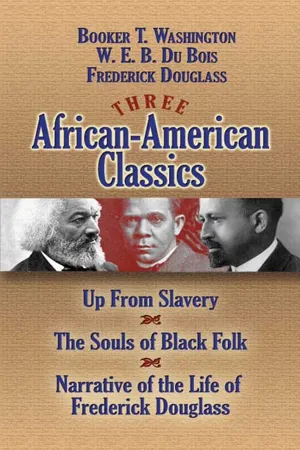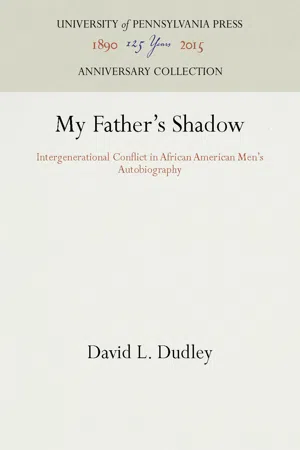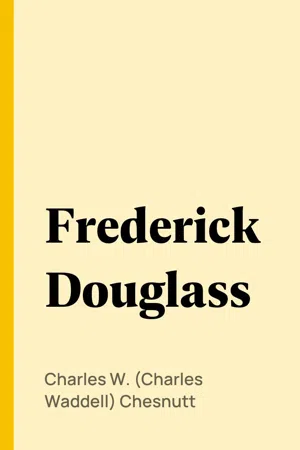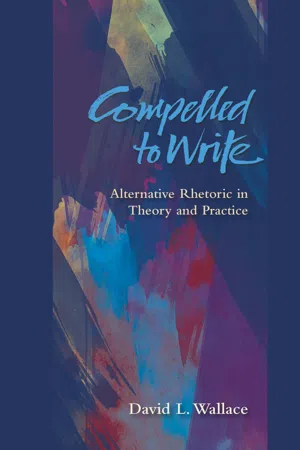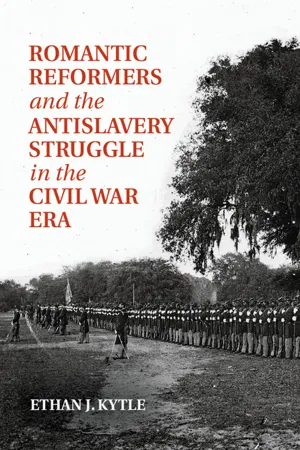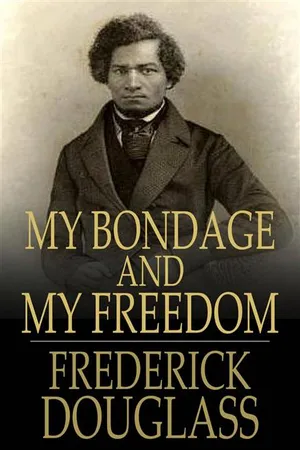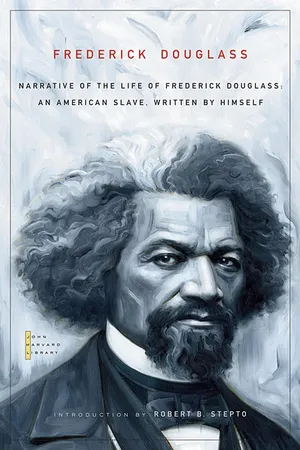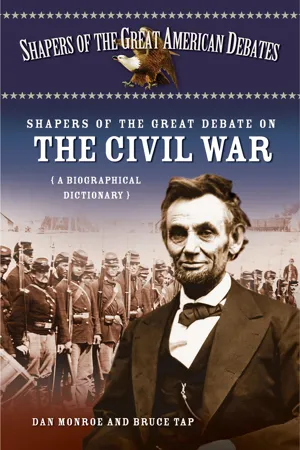History
Frederick Douglass
Frederick Douglass was an influential African American abolitionist, writer, and orator during the 19th century. Born into slavery, he escaped and became a leading voice in the fight against slavery and for civil rights. His autobiography, "Narrative of the Life of Frederick Douglass, an American Slave," remains a powerful and enduring account of the horrors of slavery and the resilience of the human spirit.
Written by Perlego with AI-assistance
Related key terms
1 of 5
9 Key excerpts on "Frederick Douglass"
- eBook - ePub
Three African-American Classics
Up from Slavery, The Souls of Black Folk and Narrative of the Life of Frederick Douglass
- W. E. B. Du Bois, Frederick Douglass, Booker T. Washington, Frederick Douglass, Booker T. Washington(Authors)
- 2012(Publication Date)
- Dover Publications(Publisher)
NARRATIVE OF THE LIFE OF Frederick DouglassPassage contains an image
Note
Perhaps the most powerful and influential black American of his time, Frederick Douglass (1818—1895) embodied the tumultuous social changes that transformed the United States during the nineteenth century. In a career of unprecedented breadth, Douglass rose from the oppression of his slave’s birth to become an internationally famous writer and orator, one of the most visible spokesmen for the Abolition movement before the Civil War and a key player in the political intrigues that followed the enfranchisement of the emancipated slaves after the Confederate surrender. An effective molder of public opinion, Douglass was a tireless lecturer and essayist and the editor of a succession of periodicals that solidified his renown while contributing significantly to the public discourse on a variety of issues.Douglass’ own experiences as a former slave formed the basis of his immensely captivating presence as an orator, and served as a major component of the three autobiographies published during his lifetime. The first of these, Narrative of the Life of Frederick Douglass, an American Slave , appeared in 1845, a few years after Douglass’ dramatic 1841 début into the world of professional moral oratory. Written in part to counter the incredulity of audiences dubious that a speaker of Douglass’ eloquence could have emerged virtually unaided from such a lowly background, and featuring introductions by noted white abolitionists William Lloyd Garrison and Wendell Phillips, the Narrative - eBook - PDF
My Father's Shadow
Intergenerational Conflict in African American Men's Autobiography
- David L. Dudley(Author)
- 2016(Publication Date)
* * * Of the numerous slave narratives published before Emancipa-tion, Frederick Douglass's Narrative has long been considered the greatest and has received the most critical attention. The work epitomizes the themes and structure of the slave narrative, and while it is part of a literature of reaction, a rejection of and rebellion against an entire social order, it also stands at the head of the autobiograph-ical line examined in this book. Ironically, this revolutionary work later assumed an authoritative character itself, which made it vulner-able to challenge in its turn. Douglass, the hero who helped destroy the paternalistic enslaving culture of his youth, later became a for-midable father figure in his own right, a power to be symbolically slain by the next generation of black male autobiographer. Frederick Douglass made his escape from slavery to freedom on Monday, September 3, 1838. Using borrowed seaman's clothing and identification papers, Douglass boarded a train from Baltimore to Philadelphia, then continued on to New York City the following day. 14 Chapter 1 A few days later, his fiancée, Anna Murray, joined him, and the two were married. Fearing for his safety even in New York, friends sent him on to New Bedford, Massachusetts, where for the next three years Douglass earned his living through various kinds of manual la-bor. During these years, Douglass found time to work for the church and to enlarge his reading. Already well acquainted with the Bible and The Columbian Orator, a book of speeches by orators such as Thomas Sheridan, William Pitt, and Charles Fox, Douglass added Sir Walter Scott, John Greenleaf Whittier, and Combe's Constitution of Man to the scope of his reading. 6 Most important, however, he be-gan reading William Lloyd Garrison's Liberator, the abolitionist news-paper that, as Douglass himself wrote, became my meat and my drink. - eBook - ePub
Frederick Douglass
A Biography
- Charles W. (Charles Waddell) Chesnutt(Author)
- 2004(Publication Date)
- Perlego(Publisher)
If it be no small task for a man of the most favored antecedents and the most fortunate surroundings to rise above mediocrity in a great nation, it is surely a more remarkable achievement for a man of the very humblest origin possible to humanity in any country in any age of the world, in the face of obstacles seemingly insurmountable, to win high honors and rewards, to retain for more than a generation the respect of good men in many lands, and to be deemed worthy of enrolment among his country's great men. Such a man was Frederick Douglass, and the example of one who thus rose to eminence by sheer force of character and talents that neither slavery nor caste proscription could crush must ever remain as a shining illustration of the essential superiority of manhood to environment. Circumstances made Frederick Douglass a slave, but they could not prevent him from becoming a freeman and a leader among mankind.The early life of Douglass, as detailed by himself from the platform in vigorous and eloquent speech, and as recorded in the three volumes written by himself at different periods of his career, is perhaps the completest indictment of the slave system ever presented at the bar of public opinion. Fanny Kemble's Journal of a Residence on a Georgian Plantation, kept by her in the very year of Douglass's escape from bondage, but not published until 1863, too late to contribute anything to the downfall of slavery, is a singularly clear revelation of plantation life from the standpoint of an outsider entirely unbiased by American prejudice. Frederick Douglass's Narrative is the same story told from the inside. They coincide in the main facts; and in the matter of detail, like the two slightly differing views of a stereoscopic picture, they bring out into bold relief the real character of the peculiar institution. Uncle Tom's Cabin - eBook - PDF
Compelled to Write
Alternative Rhetoric in Theory and Practice
- David L Wallace(Author)
- 2011(Publication Date)
- Utah State University Press(Publisher)
Frederick Douglass 79 rhetoric may be critical for teasing out oppression even among those passionately committed to working for social justice. In short, Douglass’s journey from obscurity to national prominence and his fifty years of participation in American public life and policy pro-vided him with important insights into the operation of various forms of oppression in American society, even to such nuances as how success in some aspects (i.e., the abolition of slavery and the fifteenth amend-ment) changed the nature of the struggle against injustice. 4 Given the scope and longevity of Douglass’s contributions to American public pol-icy, only a part of his experience and insight into the operation of race-based and other kinds of oppression is captured in his Narrative and in the final chapters of My Bondage . However, examining these accounts provides considerable insight into the many forms oppression takes in American society as well as an engaging description of what it meant for a marginalized American to speak back to systemic oppression. In nineteenth-century America, the forms and consequences of the dehumanization of African Americans were varied and powerful. For thousands of black men who had sex (or were accused of having sex) with white women in the antebellum South, it was a matter of life and death as local laws and social customs of the times allowed them to be lynched without a trial. Such attitudes and actions depended up upon a presumption that that these men were not fully human in that they were not seen as capable of having consensual sexual relationships with white women. In a similar way, systematic oppression also worked to dehumanize black women slaves, who were considered property and could be forced to have sex with their masters or overseers. - Ethan J. Kytle(Author)
- 2014(Publication Date)
- Cambridge University Press(Publisher)
Even though he was an honored guest who had been asked to speak publicly on the nation’s birthday, by the laws of the land Douglass remained little more than a slave. Highlighting the wide gulf that separated him from his white listeners, he held, “I am not included within the pale of this glorious anniversary! . . . This Fourth [of] July is yours, not mine.” It is difficult to find a more incendiary jeremiad in American letters. 2 Yet Douglass – in word and symbol – sounded more than this negative note. Standing before the hundreds that had gathered the black editor must have seemed living testimony to the potential that the United States offered at least a few African Americans. He was the most famous abo- litionist in Rochester, perhaps the nation’s most recognizable reformer (Figure 2.1). Despite being born in bondage, Douglass had seized his free- dom as a young man, thereafter earning a reputation as an inspiring, tireless antislavery lecturer. For the past five years, he had published his own antislavery weekly newspaper in Rochester. By 1852, Douglass was a leading figure in the struggle against slavery in upstate New York and, as a result, he was invited to speak to the Rochester Ladies’ Anti-Slavery Society. Douglass’s Fifth of July address, like the orator himself, spoke as much to hope and possibility as to the disheartening realities of antebel- lum America. For all his vitriol, Douglass refused to dismiss the nation’s founders, notwithstanding their many compromises with slavery. “They were statesmen, patriots and heroes,” he announced, “I can not contem- plate their great deeds with less than admiration.” The foundational documents they wrote, the black abolitionist added, also deserved high praise. The Declaration of Independence announced “saving principles” that should be followed “on all occasions, in all places, against all foes, and at whatever cost.” It was the “RING-BOLT” of American destiny.- eBook - PDF
- (Author)
- 2009(Publication Date)
- The Floating Press(Publisher)
Introduction * When a man raises himself from the lowest condition in society to the highest, mankind pay him the tribute of their admiration; when he accomplishes this elevation by native energy, guided by prudence and wisdom, their admiration is increased; but when his course, onward and upward, excellent in itself, furthermore proves a possible, what had hitherto been regarded as an impossible, reform, then he becomes a burning and a shining light, on which the aged may look with gladness, the young with hope, and the down-trodden, as a representative of what they may themselves become. To such a man, dear reader, it is my privilege to introduce you. The life of Frederick Douglass, recorded in the pages which follow, is not merely an example of self-elevation under the most adverse circumstances; it is, moreover, a noble vindication of the highest aims of the American anti-slavery movement. The real object of that movement 13 is not only to disenthrall, it is, also, to bestow upon the Negro the exercise of all those rights, from the possession of which he has been so long debarred. But this full recognition of the colored man to the right, and the entire admission of the same to the full privileges, political, religious and social, of manhood, requires powerful effort on the part of the enthralled, as well as on the part of those who would disenthrall them. The people at large must feel the conviction, as well as admit the abstract logic, of human equality; the Negro, for the first time in the world's history, brought in full contact with high civilization, must prove his title first to all that is demanded for him; in the teeth of unequal chances, he must prove himself equal to the mass of those who oppress him—therefore, absolutely superior to his apparent fate, and to their relative ability. - eBook - PDF
Narrative of the Life of Frederick Douglass
An American Slave, Written by Himself
- Frederick Douglass(Author)
- 2009(Publication Date)
- Belknap Press(Publisher)
N A R R A T I V E O F T H E L I F E O F F R E D E R I C K D O U G L A S S 1 Preface I n the month of August, 1841, I attended an anti-slavery con-vention in Nantucket, at which it was my happiness to become acquainted with Frederick Douglass, the writer of the following Narrative. He was a stranger to nearly every member of that body; but, having recently made his escape from the southern prison-house of bondage, and feeling his curiosity excited to ascertain the prin-ciples and measures of the abolitionists,—of whom he had heard a somewhat vague description while he was a slave,—he was induced to give his attendance, on the occasion alluded to, though at that time a resident in New Bedford. Fortunate, most fortunate occurrence!—fortunate for the millions of his manacled brethren, yet panting for deliverance from their aw-ful thraldom!—fortunate for the cause of negro emancipation, and of universal liberty!—fortunate for the land of his birth, which he has already done so much to save and bless!—fortunate for a large circle - No longer available |Learn more
- Günter Leypoldt(Author)
- 2013(Publication Date)
- Universitätsverlag Winter(Publisher)
Frederick Douglass’s Exceptional Position in the Field of Slavery 183 tively high, yet still extremely marginalized status in the field. This ten-sion made him aware of crucial discrepancies in the ideology of slavery. Questioning the system is the first and decisive step in de-naturalizing its power structure. It showed him “the direct pathway from slavery to freedom” (218), but it also shaped his fundamentally relational thinking. University of Frankfurt Works Cited Andrews, William L., ed. (1987). My Bondage and My Freedom by Frederick Douglass . Urbana and Chicago: U of Illinois P. Blassingame, John W., et al., eds. (1979-). The Frederick Douglass Papers, Se-ries One: Speeches, Debates, and Interviews . 5 vols. New Haven: Yale UP. Bourdieu, Pierre (2007). Sketch for a Self-Analysis . Trans. Richard Nice. Cam-bridge, UK: Polity Press. –––– (2005). “Habitus.” Habitus : A Sense of Place . 2nd ed. Ed. Jean Hillier and Emma Rooksby. Hants: Ashgate. –––– (2000). Pascalian Meditations . Trans. Richard Nice. Cambridge, UK: Poli-ty Press. –––– (1991). Language and Symbolic Power . Ed. John B. Thompson. Trans. Gi-no Raymond and Matthew Adamson. Cambridge, UK: Polity. –––– (1990). The Logic of Practice . Trans. Richard Nice. Stanford: Stanford UP. Brommell, Nick (2011). “A ‘Voice from the Enslaved’: The Origins of Freder-ick Douglass’s Political Philosophy of Democracy.” American Liter-ary History 23.4: 697-723. Butler, Broadus N. (1983). “Frederick Douglass: The Black Philosopher in the United States: A Commentary.” Philosophy Born of Struggle: An-thology of Afro-American Philosophy from 1917 . Ed. Leonard Harris. Dubuque: Kendall. 1-8. Douglass, Frederick (1994). Frederick Douglass: Autobiographies . Ed. Henry Louis Gates. New York: The Library of America. Du Bois, W. E. B. (2004). The Souls of Black Folk . 100th Anniversary Edition . Boulder: Paradigm. Elias, Norbert (1991). The Society of Individuals. Ed. Michael Schröter. Trans. Edmund Jephcott. Oxford, UK: Blackwell. - eBook - PDF
Shapers of the Great Debate on the Civil War
A Biographical Dictionary
- Dan Monroe, Bruce Tap(Authors)
- 2005(Publication Date)
- Greenwood(Publisher)
While Douglass still clung to the ideals of the Republican Party and resisted the notion of racial solidarity in politics, blacks suffered wholesale disenfranchisement in the South while being increasingly subject to mob, vigilante justice. Douglass's last speech, "The Lessons of the Hour," highlighted what he considered the disgraceful position of many blacks in Southern society. For Douglass, the end would come on February 20, 1895. He had just returned from at- tending a women's rights convention in Washington, D.C. He collapsed and died later that day at his home at Cedar Hill. Buried at Mount Hope Ceme- tery, Douglass's funeral was attended by numerous dignitaries including Ohio Senator John Sherman and U.S. Supreme Court Justice Harlan Mar- shall. The most popular and prolific African American of the nineteenth century had passed away. PRINCIPAL IDEAS Nature of Chattel Slavery Immorality of Slavery From his earliest days on the plantation, Douglass sensed the injustice, the immorality, and the utter unfairness of the slave system. Even as a young boy, growing up somewhat sheltered from the harsher realities of slavery, Douglass sensed that all was not right in the world. "I was a slave," Douglass asserted, "born a slave—and though the fact was incomprehen- 92 Shapers of the Great Debate on the Civil War sible to me, it conveyed to my mind a sense of utter dependence on the will of somebody I had never seen; and, from some cause or other, I had been made to fear this somebody above all else on earth." Even as a child, Doug- lass could never rationalize the rightness of the slave system.
Index pages curate the most relevant extracts from our library of academic textbooks. They’ve been created using an in-house natural language model (NLM), each adding context and meaning to key research topics.
